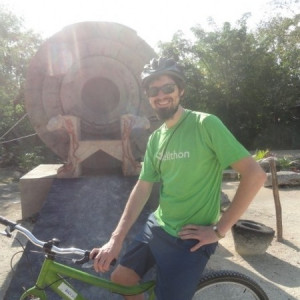How did you get started with remote work?
Interview with Celine, a VP of People Ops and remote team member
Remote work is not (yet) common practice in Europe. And it is even less common in my line of work (People Ops).
After two years of experience being remote, I can say that you work very differently whether you are in a fully distributed organization or whether you are one of the very few remote employees and everyone else commuting to an office.
In a fully remote organization, you thrive with the same tools as everyone else. That helps a lot.
You feel much more isolated, and you are not part of the working culture when you are remote with everyone else at the office. So you adopt a project management type of work, and you constantly ask questions to ensure you are not missing an important piece of information.
Celine has experienced the highs and lows of working with remote and hybrid teams—see her tips for thriving as a member of a remote team.
Read full interview from Interview with Celine, a VP of People Ops and remote team member.
Interview with Tara, a remote director of research and administration
In 2006, my now-husband started a job with a commute of two hours. He stayed near work and came home when he could, but in 2010, we decided that we needed to move closer to his job, for the well-being of both of us.
I approached my managing partner with the situation, and we decided that I could be just as effective working remotely.
We worked out a plan, and then we tried it out for six months while I was still in the city, just to work out any glitches while my husband and I built our home. In late 2011 we made the move, and now we are a 100% remote company.
A move to be closer to a spouse's job led Tara to remote work—see her tips for staying productive and organized as a full-time remote director.
Read full interview from Interview with Tara, a remote director of research and administration.
Interview with Audrey, a military wife thriving as a marketing manager
I started looking into remote work options when I married my husband - who was an active-duty Army officer at the time.
I was moving from Louisville, KY to Colorado at the time with many more moves in our future, and I knew in order to really establish a career and advance within one position, I needed it to travel with me wherever the Army took us.
Luckily, the opportunities for remote work in marketing are pretty vast—and always growing.
Honestly, when I found a position with my current company Boldly it was not a difficult transition for me to leave office jobs behind.
I am a natural introvert, and I focus better in my own environment — so I found remote work very conducive to my preferred work style.
The company has a very inclusive culture, so even though I am working on my own, I never feel 'alone.'
I've been working remotely with Boldly for five years now, been promoted and genuinely enjoy what I'm doing — so it's literally a dream realized.
Marrying an active-duty army officer sent Audrey on the search for a remote work position—see how she has established her career while staying on the move.
Read full interview from Interview with Audrey, a military wife thriving as a marketing manager .
Interview with Sarah Archer, a content marketing manager & remote work techie
The company that I work for, Siege Media, has always supported employees who want to work from home at least once per week, but I took it a step further and pitched my CEO on transitioning to working remotely full time.
We worked together to come up with a plan that would benefit the company and keep me productive, and now I’ve been working remotely for over a year.
From noise-canceling headphones to Basecamp—content marketer Sarah shares her must-have remote work tools & essential productivity tips.
Read full interview from Interview with Sarah Archer, a content marketing manager & remote work techie.
Interview with Lauren, a content marketing team lead and hybrid remote worker
As a content writer, much of my work can be done remotely. I live in Chicago and especially during the winter, there are days where leaving the house is out of the question. After having to make a few miserable commutes in my career, I focused on finding a job that allows me the flexibility to work remotely at least twice a week.
When I came to G2, they promoted their WFH policy proudly as a perk and I was sure to ask around with people I knew who worked there to ensure the policy was as flexible as they claimed. And it is!
I think anyone looking to work remotely part-time or full-time should have those conversations upfront to ensure they’re getting what they want.
For Lauren, remote work was a non-negotiable arrangement—see how she manages a hybrid remote work situation and her tips for those on the remote job search.
Read full interview from Interview with Lauren, a content marketing team lead and hybrid remote worker.
Interview with Shelly, CEO of Fire Engine RED & remote work pioneer
We’ve been fully remote since I founded the company in 2001.
In fact, Fire Engine RED was one of the first all-remote companies in the U.S., possibly the world.
I’d love to say that my decision to start a 100 percent remote company was part of some grand vision (like, “This will be the future of work!”). However, the truth is, Fire Engine RED began operating as a virtual company out of pure financial necessity.
Twenty years ago, Shelly started one of the first all-remote U.S. companies. See how remote work has given Fire Engine RED a competitive advantage & the four most important words in the employee handbook.
Read full interview from Interview with Shelly, CEO of Fire Engine RED & remote work pioneer.
Interview with Alyssa, a copywriter and content strategist
I took a remote paid marketing internship for a music technology company.
Alyssa has found her rhythm as a freelancer and founder of the blog, Freelancing Flow—see her tips for keeping it all running smoothly.
Read full interview from Interview with Alyssa, a copywriter and content strategist .
Interview with Vernon, a freelance technical writer
A few years ago, 2012 I think, I began hearing about the freelance industry (well, it’s not quite an industry in the technical sense, it’s more a mode or collection of industries, but you know what I mean) and the possibilities thereof.
Now, being a creative, I was open to the idea of being a freelancer, but I hadn’t quite thought of it seriously. At the time I was still entrenched in the traditional (at least where I come from) world of the 9 to 5, a regular paycheck, J-O-B.
Last year I had been working at a high school as a system administrator before my contract ended. I was searching for my next job, doing interviews and sending out resumes, when I recalled that I created a profile on Upwork, an online freelance marketplace, some years before as a test of sorts.
I figured “Ok. In the meantime, until I get something else, why don’t I hustle online?” Almost simultaneously, I was exposed to technical writing and, it turns out, I wasn’t bad at it.
I also started exploring freelancing as a career choice and found, after running the numbers and doing the cost-benefit analysis, that this would be almost perfect for me.
Some would call me weird or crazy (I’m also a musician) but I don’t like large, constricting structures. I realized that I’m kind of an entrepreneur at heart and that, as a freelancer, I could maintain the kind of lifestyle that I wanted to live. My time and focus would, mostly, be mine to manage. The path of my career would be mostly under my control.
My progress and my earnings would not be dictated by the whims and decisions of a handful of middle managers or bureaucrats (in the case of working for the government) but by my sweat and effort and assessment of the industry landscape.
It’s risky, absolutely, but the risk is mitigated by knowledge. And you gain the knowledge you need through research, training, experience, and networking with those who’ve been doing it longer than you. But you also need tenacity. Your business, as a freelancer or entrepreneur or investor, will not become successful overnight. It’ll take time, and it’ll take consistent effort but, for those who choose this path, it’ll be totally worth it.
As for other things I've done, as I said, I've worked as a high school computer lab technician and system administrator. However, I've also been an information technology manager for a small company; an IT support agent; a technical support team leader; customer service and technical support trainer; and, most importantly, a musician (I had a band for eight years. Good times).
Apart from being a musician, all of these jobs were 9 to 5's with regular salaries. Being a musician, that kind of life can feel “soul-sucking,” but I had my band and my music. That allowed me to survive spiritually, while the jobs gave me a steady income that allowed me to survive physiologically.
Transitioning to remote work was risky, but I believed in it. Still, do. That’s why I’m still doing it. My income is not where I would like it to be, but it has been growing steadily as I get better at it. Plus, the market is, by definition, worldwide.
Yes, I’m competing with people from all over the world, but there’s more than enough to go around in my estimation.
Vernon is a freelance software technical writer that uses lists to organize his hectic freelance schedule—see how he maximizes his time throughout the workday.
Read full interview from Interview with Vernon, a freelance technical writer .
Interview with Kati, a co-founder shares her tips for juggling multiple side hustles
Without giving away my age, I started working for myself from home before the internet was popular, and before everyone had a computer in their home. I was an early adopter of technology and saved up to buy a PC so I could create contracts for my in-home daycare.
As a side hustle, I began creating contracts and intake forms for other daycares, which lead to some desktop publishing for local businesses. At the time, most remote work opportunities were envelope stuffing or court record research. And there were lots of scams that I, unfortunately, bought into.
I was frustrated and wanted to make more money, so I created my own niche.
Since then, I have always had a remote side hustle. Eventually, I was able to work remotely at least part of the time in my corporate jobs.
Recently, I left the corporate world to pursue my own adventures remotely.
Kati has made a career at using the internet and gig economy to her advantage—see how she successfully manages multiple side hustles and a business.
Read full interview from Interview with Kati, a co-founder shares her tips for juggling multiple side hustles.
Interview with Laurent, an introverted remote worker & engineer
I started working remotely 11 years ago. At the time, I didn’t really think it was possible to be hired to work remotely.
I thought this was only a privilege you could get after having worked for some time for the same employer.
So I was quite happy and considered myself lucky to find that opportunity. It was for a Bay Area-based company, that was one of the few competitors we had at my first company. One of my previous co-workers worked there, and our specialized background made us really attractive to them. So we got hired as remote employees.
After that, I really wanted to be able to keep working remotely. I didn’t want to work from an office full time anymore. Not wasting time commuting, being able to live wherever I wanted to, being able to spend more time with my kids, the possibility to travel more were the biggest reasons why I wanted to keep working remotely.
I was still skeptical of being able to find remote positions, but I knew I wanted to try every time.
As such, I was taking a lot of effort to apply to places where my background was really relevant, and where I knew the skills they were looking for was hard to find.
This was giving me more confidence when selling myself in the interview process.
As time went by, I also found more and more places that were open to remote hires. So now, I’m not worried at all about finding a remote position if needed. However, I’m not looking right now 😉.
In this interview, this VP of engineering shares his strategies for managing family time and organizing meetings as an introvert.
Read full interview from Interview with Laurent, an introverted remote worker & engineer.









